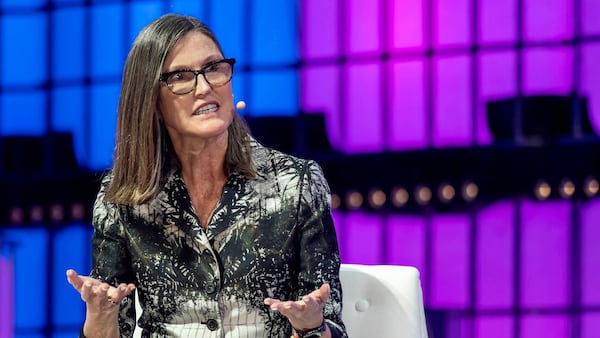A series of filings from major investment firms to provide Bitcoin spot ETFs has raised existential questions for smaller, crypto-native firms that already offer investment products in this sphere.
The CEO of digital asset investment firm CoinShares said the threatening landgrab makes the case for specialised firms like his.
Crypto investment firms are wary of being outmuscled by well-resourced financial goliaths like BlackRock, which are diving into crypto.
But Jean-Marie Mognetti, the CEO of CoinShares — one of Europe’s largest and first digital asset-native asset managers — says his firm has the battle-tested experience and specialist sales chops to outgun heavyweights.
“If you want to get heart surgery, do you go to a cardiologist or do you go to your GP?” Mognetti told DL News.
“BlackRock is a bit of a GP, it can service every part of your body to a certain level. After that, they need to refer you to a specialist. For crypto this specialist is CoinShares — we are laser-focused on crypto.”
This summer, asset management titan BlackRock led a slew of applications from investment firms for permission to offer spot Bitcoin exchange-traded funds.
‘BlackRock is a bit of a GP, it can service every part of your body to a certain level. After that, they need to refer you to a specialist.’
NOW READ: BlackRock’s aim to make crypto cheaper should scare Coinbase
The Securities and Exchange Commission has until mid-2024 to decide whether to approve these applications. There’s no guarantee that it will — the regulator has disapproved every attempt to offer spot Bitcoin ETFs so far.
Nonetheless, the filings have taken on a broader significance. To many industry wonks, the filings signify the inexorable encroachment of institutional investors on crypto.
For smaller firms that have long offered crypto exchange-traded products, that’s a mixed blessing.
Financial behemoths like BlackRock, as well as Fidelity, Invesco and WisdomTree — which all made copycat filings — will bring their heft to the asset class. That means maturing market structure, more legitimacy in the eyes of regulators and more inflows into the market in general.
These giant firms just might eat crypto natives’ lunch.
NOW READ: Wall Street’s Bitcoin land grab may push crypto firms ‘by the wayside,’ say finance veterans
Like many digital asset managers, the vast majority of investors in CoinShares, which manages about $2.14 billion in assets, are retail. But Mognetti said the firm has laid solid groundwork for crypto’s institutionalisation — emphasising dialogue with regulators, listing on the Nasdaq Stockholm, and partnering with established names in finance.
These include Invesco and Japanese investment bank Nomura, with whom CoinShares partnered to found a digital assets custody bank called Komainu.
Validation
But the fact that big firms want to muscle into the world of digital assets just proves that his firm has been on the right path, Mognetti said.
“I welcome this interest because it validates the narrative, it validates the whole story. That’s fantastic,” Mognetti said.
NOW READ: Nomura crypto exec on finance ‘land grab,’ the SEC crackdown, and playing the long game
To make it in crypto, firms must be innovative, Mognetti said.
This might be an area where firms like his have an edge over larger, slower rivals. Earlier this week, indeed, former Citigroup executive Itay Tuchman told DL News that younger and smaller crypto firms tend to have better “technical capability and speed of build.”
“If this evolves in the way that other financial services technologies have evolved, there will be some new companies that succeed,” Tuchman said.
As proof of CoinShares’ innovative chops, Mognetti points to the firm’s rollout of staked crypto ETPs. These are investment products that aim to share staking revenues with investors.
FTX woes
CoinShares grew out of an energy commodities business that pivoted to crypto in 2013.
The firm now offers a range of exchange-traded products. ETPs are a hallmark of passive investing — that is, products that programmatically track indexes or underlying commodities. That’s opposed to active asset management, where a portfolio manager makes investment decisions on clients’ behalf.
Mognetti said good investment specialists have to have proven experience. CoinShares has weathered the kinds of storms associated with an infant and highly volatile asset class, including the “turbulence surrounding the ICO craze” and three market downturns.
NOW READ: Fed scrutiny on crypto banking is a gift to giants like BlackRock — and more oversight may be coming
That includes last year’s annus horribilis — in May 2022, CoinShares reported a $21 million loss from exposure to failed stablecoin project Terra; in November, it announced it had a $30 million exposure to collapsed exchange FTX. It announced a 29% drop in income in the last quarter of 2022.
Mognetti said during the firm’s Q1 2023 earnings call that the firm had beefed up its risk management controls. In Q2 2023, the firm reported a 33% increase in total revenue compared with Q2 2022.
Institutional ramp-up
CoinShares is now in the process of a strategic pivot away from its passive strategies, converting its prop desk to an active asset management arm.
The company announced these plans in its Q1 2023 report. Mognetti said during the earnings call that there is increased demand from the firm’s traditional customers for new ways to invest.
Active management in crypto has been CoinShares’ goal since the early days of the firm, Mognetti said. In its early days, however, the necessary infrastructure to offer that kind of service at scale was lacking.
Now, however, the firm can lean on Komainu, for example.
The firm also has a strong research base to offer investors as it makes this move, with an established insights team led by James Butterfill.
Mognetti said the firm is seeing gradual uptake by investment firms.
“Retail remains a strong foothold for us, but our institutional expectations and investment thesis are getting more and more solid,” he said.
The interest started small, he said, with high net worth investors leading on to smaller family offices.
“Then you get multi-family offices, then you see some small asset management companies — it’s gradually progressing up a hierarchy toward the big names,” Mognetti said.
CoinShares isn’t netting the bigger fish just yet, but “we are at the point where some sovereign wealth funds are buying their first crypto,” he said.
Do you have a tip or an opinion you’d like to share about TradFi’s move into crypto? Contact the author at joanna@dlnews.com



